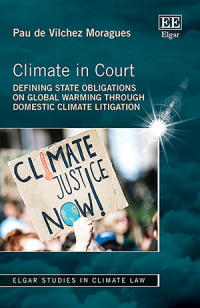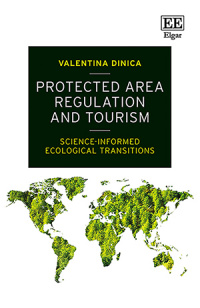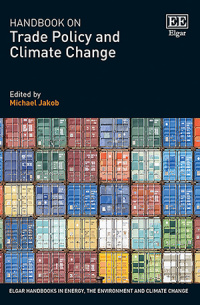
精装
Voluntary Approaches in Climate Policy
自愿方法(VAS)越来越多地在不同国家作为环境政策的主要工具实施。作者专注于(VAS)的经济学,其优势和缺点以及与其他气候政策工具的比较。
更多信息
Critical Acclaim
贡献者
内容
更多信息
自愿方法(VAS)越来越多地在不同国家作为环境政策的主要工具实施。作者专注于VAS的经济学,其优势和缺点以及与其他气候政策工具的比较。
气候政策中的自愿方法说明了如何利用公司自愿主义来减轻企业的气候影响,并在公司层面和气候政策的背景下评估VAS的经济性。它继续探索他们的效率和有效性,如何与其他工具进行比较和结合,如何影响竞争以及为什么被采用。许多问题得到了解决和回答,例如:
•在不同国家实施了哪些VA?
• How did they perform under various economic and environmental criteria?
•增加公司参与VA的关键因素是什么?
• How do VAs combine with other climate policy instruments such as carbon taxes and emissions trading?
•如何设计它们以提高性能?
该书还包含VAS的概述,并摘要每项贡献,其主要政策含义和未来研究的建议。
这本可访问的书突出了VAS在政策术语中的含义,将吸引广泛的受众,包括经济学家,社会科学家,政策制定者和商业经理,以及对气候变化有特定兴趣的环境科学家和从业人员。
气候政策中的自愿方法说明了如何利用公司自愿主义来减轻企业的气候影响,并在公司层面和气候政策的背景下评估VAS的经济性。它继续探索他们的效率和有效性,如何与其他工具进行比较和结合,如何影响竞争以及为什么被采用。许多问题得到了解决和回答,例如:
•在不同国家实施了哪些VA?
• How did they perform under various economic and environmental criteria?
•增加公司参与VA的关键因素是什么?
• How do VAs combine with other climate policy instruments such as carbon taxes and emissions trading?
•如何设计它们以提高性能?
该书还包含VAS的概述,并摘要每项贡献,其主要政策含义和未来研究的建议。
这本可访问的书突出了VAS在政策术语中的含义,将吸引广泛的受众,包括经济学家,社会科学家,政策制定者和商业经理,以及对气候变化有特定兴趣的环境科学家和从业人员。
Critical Acclaim
‘While in the context of pure environmental economic theory, national policies and cross-country evaluations by several international organizations voluntary agreements have been repeatedly assessed, an in-depth economic evaluation of voluntary agreements in climate policy has been lacking. Baranzini and Thalman have closed this gap and their collection of articles will be a standard reference for some time to come.’
– Axel Michaelowa, Climate Policy
– Axel Michaelowa, Climate Policy
贡献者
贡献者:J。Albrecht,A。Baranzini,T.B。Bjørner,R。Brau,C。Carraro,A。Cavaliere,M。Delmas,G。DeMuizon,M。Glachant,P。Glasbergen,C。Gonseth,C。Gonseth,S。Greperperud,B.M。Haddad,R.B。Howarth,M。Khanna,C。Langpap,T.P。里昂,J.W。Maxwell,J。Mazurek,B。Paton,P.A。佩德森(D.T. Ramirez),K。RotiJones,K。Segerson,P。Thalmann,
内容
内容:前言前言1。概述的Economics of Voluntary Approaches in Climate Policies 2. Effectiveness of Voluntary Approaches: Implications for Climate Mitigation 3. Do Voluntary Approaches to Climate Change Lead to Efficient Environmental Protection? 4. Voluntary Approaches as Climate Policy Tools: Competition Issues and the Role of Market Structure 5. Self-enforcing Voluntary Approaches with Incomplete Information and Environmental Uncertainty 6. Public Voluntary Programmes for Mitigating Climate Change 7. Voluntary Approaches under Uncertainty and Irreversibility 8. Negotiated Agreements and the Demand for Political Legitimacy 9. The Architecture and Functioning of Dutch Negotiated Agreements 10. Energy Efficiency and Greenhouse Gas Emissions: Correcting Market Failures Using Public Voluntary Programmes 11. A Transaction Cost Perspective on Negotiated Agreements: The Case of the USEPA XL Programme 12. Voluntary Approaches and Technical Regulation in the Future Development of EU Climate Policy 13. The UK Climate Change Levy Agreements: Combining Negotiated Agreements with Tax and Emission Trading 14. Swiss Climate Policy: Combining VAs with Other Instruments under the Menace of a CO2 Tax 15. An Empirical Analysis of the Effect of the Danish Energy Agreements Index




